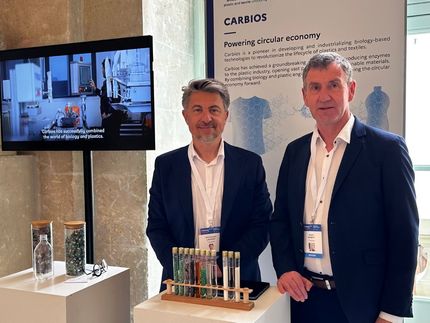Polystyrene Upcycling
Recovering Valuable Chemical Building Blocks from Polystyrene Waste
polystyrene, the main material in plastic tableware and insulating materials, is a widely used polymer but is currently difficult to recycle. Reporting in the journal Angewandte Chemie, a team of US researchers have now developed a thermochemical approach, making it possible to recover valuable chemicals from polystyrene waste in a simple two-step process. This new approach could enable the recycling of insulating and packaging materials for a truly circular plastics economy.

© Wiley-VCH
The newly developed “Degradation Upcycling” (Deg-Up for short) makes it possible to produce a wide array of highly valuable aromatic chemicals to be produced from polystyrene waste, as explained by Guoliang Liu and co-authors from Virginia Tech in Blacksburg, USA, explain. The process involves a two-step cascade: in a first step, polystyrene is broken down to give benzene as main degradation product, and in a second step this benzene product is chemically modified in the same reactor. The process gives rise to benzene derivatives, covering many important substances for the cosmetics and pharmaceuticals industries.
Methods for breaking down polystyrene into benzene usually require expensive catalysts, are energy-intensive, or produce a complex mixture of products. Liu and colleagues’ new thermochemical method uses inexpensive aluminum chloride catalysts and can be performed in reactors at a moderate 80 °C (ca. 180 °F). Another advantage of their method is the clever use of the solvent, benzene. “Only the amount of benzene recovered from the polymer is converted into the desired chemical. Unused solvent can be recycled to process more polymer feed,” Liu says.
As a proof of concept, the team dissolved various types of polystyrene waste, such as packing peanuts and plastic utensils, in benzene, and heated the mixture in a reactor under air-free conditions with aluminum chloride as the only reagent. The liquid product, consisting primarily of benzene, could be used directly to obtain the desired value-added chemicals in high yield and with high selectivity.
For example, by adding the reagent acetyl chloride, the team obtained acetophenone, an important chemical in the cosmetics and pharmaceuticals industries. By adding the related reagent oxalyl chloride, the team obtained benzophenone, a common ingredient in sunscreen products and plastic additives. In addition, sulfur-containing aromatics, some of which are used as high-performance solvents in the polymer industry, were produced with a high degree of selectivity from polystyrene waste.
The goal of this new chemical upcycling method is to recycle large volumes of polystyrene waste into value-added chemicals for other industrial processes. Having a low density, polystyrene insulating materials are not well-suited to mechanical recycling, i.e., the process of sorting, shredding, and transportation of materials for the profitable manufacture of new products. The Deg-Up process described here, on the other hand, is robust, tolerant of contamination, and suitable as a platform for chemical upcycling of large-volume polystyrene waste.
Original publication
Other news from the department science

Get the chemical industry in your inbox
By submitting this form you agree that LUMITOS AG will send you the newsletter(s) selected above by email. Your data will not be passed on to third parties. Your data will be stored and processed in accordance with our data protection regulations. LUMITOS may contact you by email for the purpose of advertising or market and opinion surveys. You can revoke your consent at any time without giving reasons to LUMITOS AG, Ernst-Augustin-Str. 2, 12489 Berlin, Germany or by e-mail at revoke@lumitos.com with effect for the future. In addition, each email contains a link to unsubscribe from the corresponding newsletter.






























































